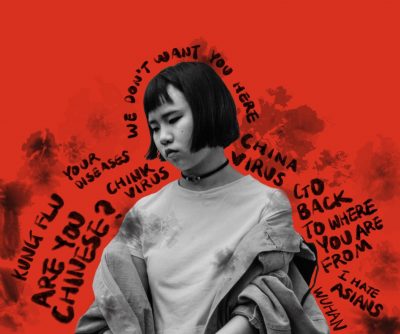With flags of the world lining Sauder Concert Hall in anticipation of the 2021 International Student Coffeehouse last Saturday, a striking red poster made by junior Yujin Kim took center stage.
“Stop the spread of racism,” it read. “Asian hate crimes increased by nearly 150% in 2020. Over 2,000 hate crimes have been reported since the beginning of the pandemic.”This call for justice came just four days after eight people were killed at massage parlors in the Atlanta area. Six of the people killed in the shooting were Asian, raising fears that the crimes may have targeted people of Asian descent.
“As an individual who falls under the category of Asian, I’ve been heartbroken, and I often think these things could happen to my friends and family,” said Kim, who made the poster for a graphic design class, motivated by the topic of Asian hate crimes. “I simply wanted to communicate the severity of the issue and the urgency to hold perpetrators accountable and to stop the spread of racial violence and terrorism towards Asian communities and individuals.”
On March 18, Goshen College President Rebecca Stoltzfus expressed continued solidarity with Asian-American and Asian neighbors and colleagues.
“At the start of the pandemic a year ago, I expressed solidarity with and commitment to our Asian-American, Asian and Pacific Islander (AAPI) students and employees, whose racial and ethnic communities were under assault,” President Rebecca Stoltzfus said in a campus-wide email. “Today, racism and violence against AAPI individuals and groups continues and is increasing in intensity. Now more than ever, we must continue to stand in solidarity and commitment with AAPI people — including the students and employees on our campus — deeply affected by blame, hate, discrimination, racism and violence.”
President Stoltzfus’ statement echoes the cry of many following the shooting, including U.S. President Joe Biden.
“They’ve been attacked, blamed, scapegoated and harassed,” President Biden said. “They’ve been verbally assaulted, physically assaulted, killed. It’s been a year of living in fear for their lives.”
Until the shooting in Atlanta, it had been a year since a large-scale shooting had taken place in public, though the Asian community has witnessed increased hate crimes over the past year – a product many say is connected to former President Donald Trump’s naming of the coronavirus as “the Chinese virus.”
At Goshen College, 2% of the student body, or 21 students, identifies as Asian, while 5%, or 49 students, note that Asian is one piece of their identity.
Goshen College’s Office of Diversity, Equity and Inclusion had already been planning for an Intergroup Dialogue workshop Friday, March 26 and Saturday, March 27, but the facilitation has now been rescheduled for April 30 and May 1.
“The recent acts of injustice and violence against the Asian community hold impact and import when we lift our voices and when we hold them silent,” said Dr. LaKendra Hardware, director of diversity, equity and inclusion. “Our hope is that people can share in the learning experience together and add to their own personal toolbox for better navigating and advocating whenever identity-based injustice and harm threatens the security of individuals or communities.”
“Racist and violent behavior against the AAPI community must stop,” President Stoltzfus said. “Scapegoating must stop, harassment must stop and hate must stop.”
The mass shooting in Atlanta was the first of seven in the United States in the past seven days, according to CNN, which defines a mass shooting as “a shooting incident which results in four or more casualties (dead or wounded) excluding the shooter(s).” The most recent of these shootings took place at a grocery store in Boulder, Colorado on Monday.
“The two incidents are likely to spur discussion about gun control legislation in the United States, where firearm deaths are tragically common,” a statement from CNN said.



